If you have deconstructed a pattern you’d like to have considered for TanglePatterns, here’s everything you need to know …
FIRST – Make sure you have looked through the most recent edition of my TanglePatterns TANGLE GUIDE to see if the pattern has been published here already. I often receive submissions of tangles that are duplicates or near duplicates of ones already on the site.
Note: “official” tangles are the ones introduced by Zentangle® founders Rick Roberts, Maria Thomas, and Maria’s children, Molly Hollibaugh, Martha Huggins and Noah Thomas. You can find the list of Zentangle-original tangles on the ZENTANGLES > LINDA’S LIST OF OFFICIAL TANGLES page on the menu bar at the top of every page.
Is it really a tangle? (aka Maria’s Rules)
A tangle has no pre-planning with pencil guidelines, grids or dots, no erased lines.
It’s just pure Zentangle magic . . . one pen stroke at a time.
As Rick and Maria put it, tangles should be “magical, simple and easy to create”, non-representational patterns of repetitive stokes that are easy to teach and offer a high degree of success to tanglers of all ages.
Complex patterns require thinking about how to build them and not readily allowing one to get into the “unthinking” rhythm of a Zentangle experience. Simple tangles are the Zen of Zentangle.
A pattern is not always a tangle. (Un motif n’est pas toujours un tangle.) (Un diseño no es siempre un tangle.) Tangles are hand drawn structured patterns with very specific attributes:
- a tangle is abstract, non-objective (non-representational)
- a tangle has no up or down orientation – no “right side up”
- a tangle is usually an all-over pattern that grows organically, rather than a single medallion-type motif that must be repeated
- generally a tangle is at most 2 or 3 simple (“elemental”) strokes, repeated. As Maria points out in the IDOZ 2025 video, “If it didn’t repeat, you would be drawing“.
- a tangle is simple enough to draw without using a pre-printed grid such as graph paper (note: steps should not be drawn on grid/graph or matrix paper)
- a tangle does not use pencil dots, grids, guidelines or an eraser (including pre-planned strings) or an eraser “A tangle has no pre-planning with pencil guidelines, grids or dots, no erased lines.”
- a tangle never uses rulers, stencils, or any other mechanical aids
- a tangle is elegant, unique
Is it new, is it unique?
“Ornamental pattern-work, to be raised above the contempt of reasonable men, must possess three qualities: beauty, imagination, and order.” ~ William Morris
If a tangle isn’t new or it’s a variation of an already published pattern, it is unlikely it will be published here. So if you are relatively new to the Zentangle® method please be aware of the following:
When we think we have created a “new” pattern it’s only natural to get excited to jump in and publish it. But if you are new to this art form it’s a good idea to do your homework first. Not only because it’s fun and you’ll learn a LOT, but also because it’s up to you to make sure yours IS actually a new pattern. We are often subconsciously “programmed” by other patterns we’ve seen, and many patterns are simply universal in nature.
Between the Zentangle books and online there are hundreds of patterns already published. So check these sources first and become familiar with existing patterns, particularly the official tangles. Have fun drawing them and if in the process you prove to yourself that your pattern is new, then go ahead and submit it.
Naming your pattern
Rick and Maria explain: “we describe Zentangle’s method as ‘non-representational.’ It’s also why (for the most part) we give our tangles names that have little relationship with what a tangle looks like.”
“We usually choose names that don’t create a preconception of how a tangle should look.“
Also for this reason, tangle names are not phrases but usually a unique single word. I’m sure you can appreciate that “message” tangle names would not be very Zentangle®-like.
See if you can come up with a great “non-representational” name for your tangle too. Be creative!
“Seasonal tangles”
Tangles for special seasons (Valentine’s etc.) are best submitted a month in advance to allow time to fit them into my planning of the variety and sequence of tangles posted. This is not a hard and fast deadline but early submission improves a pattern’s chances of publication.
How to submit your pattern
I am especially interested in as-yet-unpublished patterns. In other words your pattern is not online or in print anywhere yet and it will appear first on TanglePatterns.
That being said, I am always interested in including the best patterns on TanglePatterns. So even if you have already published your pattern online feel free to send me an email with your pattern name and the website page (URL) where you illustrate the steps so I can link to your page. Be sure to include an attachment of your tangle steps image.
Please note that I do not link to galleries, videos, Facebook or Instagram. Your pattern must have printable steps that tanglers can refer to offline, and its own unique URL.
Your illustration should demonstrate how you’ve used your pattern in a Zentangle. Any additional tangles you include in your example should be tangles that are already on TanglePatterns.
If you don’t have a website or simply prefer to have the instructions posted with your pattern here on TanglePatterns:
- Please use this PDF to draw the steps: TanglePatterns Tangle Submission >> right click to save/download PDF.
- If you prefer to use your own format please note the steps must NOT be drawn on graph or gridded paper (see “Is it really a tangle?” above). They should also be in Portrait orientation (not Landscape) in order to fit on the site.
- Include a Zentangle featuring your pattern so others can see your pattern in use.
- Steps drawn using a ruler (or any other mechanical aid) are not eligible. (See “Is it really a tangle?” above.)
- Scan the finished page as a jpg file at 300 dpi in color so the red steps in your instructions are clear (see a very good example here)
- Then rename your file(s) with your pattern name and your name, like this: pattern1-joan-smith.jpg, pattern2-joan-smith.jpg etc. (replace “pattern1” etc. with your pattern’s name)
- Email your scan(s) as an attachment, do not insert them into the body of the email. Note to Mac users: please see this page about how to prevent Apple Mail from downsizing your images, please send scans actual size.
- Include the name of your pattern in the subject line of your email.
- Be sure your bio, tips and any other text is typed in the body of your email so I can copy and paste. I can’t copy from images.
- Whether you have already published your pattern online or are submitting it here for first publication, please include a brief comment about its inspiration, tips on drawing or shading or variants, or whatever you’d like to say about it. And a couple of sentences background about yourself to share with our readers too.
- When your example includes additional tangles, be sure to list them in your email. It saves my memory some wear and tear! 🙂
- Be sure to include some type of message in your email. For security reasons blank emails with attachments are treated as Spam and are not delivered. This means I will not receive your email if you haven’t written a message in the body of the email.
- And please, no computer-generated drawings. Zentangle® is all about pen and ink.
My email to send your pattern and information is: linda [AT] tanglepatterns [dot] com. Don’t flood my inbox with patterns, choose your favorite and start with that.
Due to the volume of email I receive, it can take up to a week before I can respond to your submission. Rest assured I do review every email and I will reply.
Due to the variety of factors I take into account in selecting tangles and planning the sequence/variety posted it isn’t possible to give feedback or say if or when a pattern will be added.
Sending your pattern does not guarantee it will appear on the site but if it is both new and unique (and meets the qualifications on this page) it stands a good chance. In general, variations of existing patterns are not published unless they are very unusual — and simple.
If you have submitted a pattern and it has not appeared on the site, this page explains the top reasons why.
Thanks for your patience.
Thanks, everyone for your contributions to this Zentangle® resource!
|
.oOo. |
|
Enhance your Zentangle experience while supporting TanglePatterns: |
|
BRAND NEW! TanglePatterns.com TANGLE GUIDE, 2026 Edition |
|
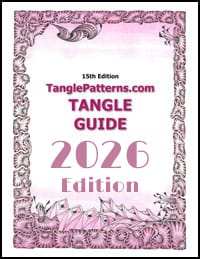 |
The 15th Edition of the TanglePatterns.com TANGLE GUIDE is an instant-download 123-page interactive digital eBook/PDF containing over 2,300 tangles on the site from May 2010 through December 31, 2025. It's a great resource and a must-have digital tool for using the site. Visit the STORE > E-BOOKS page and help keep TanglePatterns.com going by getting your copy now! |
|
"Linda, Thank you! I was relying on too few and getting stuck after 3 years of daily working with Zentangle. This has inspired me to ‘begin again’ with renewed excitement." ~ Barbara R. |
|
| See the BOOK REVIEWS page for more details on its features and view a sample page. Note: this is a digital product to download immediately when ordering, nothing will be physically mailed to you. | |
| If you're new to Zentangle® and tangling, my TanglePatterns.com BEGINNER'S GUIDE TO ZENTANGLE is just what you need to get started. Also available en Français and en Español. | |
|
|
|
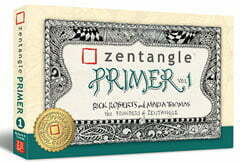 |
This is the only Zentangle book you'll ever need: the fabulous Zentangle PRIMER Vol 1. It's your CZT-in-a-book by the founders of Zentangle®. For more about the content and to read the rave reviews, visit the BOOK REVIEWS tab. |
| Available in KINDLE format for $9.99. Spanish Edition here. Japanese Edition here. | |
| "Absolutely the best Zentangle Book yet! As an accomplished artist I used to think I did not need instruction on this art form. How wrong I was! My tangling improved by leaps and bounds after reading this book. If you think you have Zentangle down then you need this book more than ever!" ~ Kris H | |
|
|
|
|
.oOo. |
|

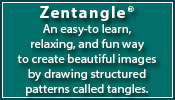
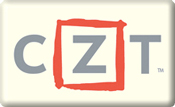

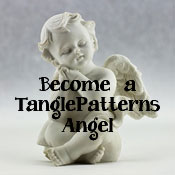
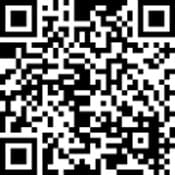
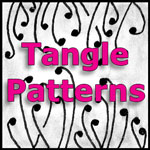
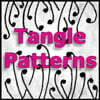
RECENT COMMENTS